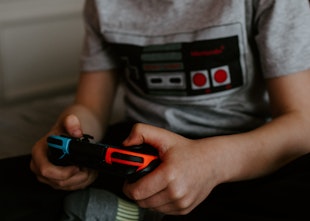Studies show the amount of time a child spends on a screen isn’t actually as important as how dependent the kid is on the screen.
Debates around screen time are also moving to focus increasingly on the quality of screen time over the quantity.
Almost every parent stresses about how much screen time their kids are having per day. Spending too much time in front of a screen has been linked to disruption of sleep, poor social skills and even speech delays.
Some studies have found that the bigger issue is whether screen use causes problems in other areas of life and has become an all-consuming activity.
Classic signs of addiction include things like an inability to stop using the substance or when the use of that substance begins to interfere with your life and relationships. Shockingly, when it comes to children and screens, the symptoms aren’t all that different.
Here are some red flags to keep an eye out for that suggest your kid might have a screen addiction.
1. Your child can’t control their screen use
Researchers call this “unsuccessful control,” when kids have trouble stopping using devices. If you’ve tried to impose limits on screen time, but your little one just couldn’t deal, or if you have given a 10 minute warning but they still lose it when it’s time to switch it off, this could be an issue.
2. Loss of interest in other activities
If “screen time” is the only thing that motivates your child (books, toys and sports don’t get them nearly as excited), they might be too invested in screen use.

3. A sudden change in mood
If your child appears to become "glued into a screen" and asking them to pay attention or listen to you results in a temper tantrum or a sudden fit of anger - it's time to switch all devices off.
4. They have a headache
This one is a big red flag. If your child seems to be having a lot of screen time - be it on a device or watching television excessively, and then starts complaining about headaches, the screen time may be beginning to actually affect their health. It is now time to take them away from the screen ASAP and opt for a short digital detox, followed by a more regulated and scheduled electronics timetable.
5. They are having trouble sleeping
Sleep problems are an indicator that your child is getting too much screen time, particularly in the evening. Making sure your child doesn't use electronics past a certain hour and most importantly, doesn't bring any to bed. When children spend time on a screen they quickly enter a hypersensitive, hyperactive state of mind: falling asleep in this state is virtually impossible. It’s impossible for a child and the parent as there is no talking a child down when they’re in that hyperactive state. All rationale goes completely out the window!
6. They stop interacting with their friends
If your child is opting to stay in over going out to play or participating in activities with their friends, it could be time to revisit their schedule.
How can you reduce screen time?
1. Set a schedule
Some parents choose to set a specific daily duration and time when kids are allowed on screens in the hope that the child will understand and accept their “scheduled” time.
2. Make Screen Time a Privilege
One of the ways in which screen time has changed dramatically in recent years is that it's often felt to be more of a right than a privilege. If you grew up watching the four TV channels available, you may have felt fortunate to watch a cartoon on Saturday morning. The combination of having just about anything available on a screen 24/7 places more pressure on parents to say when a child can and cannot have screen time. Make it clear that screen time is a privilege that needs to be earned. Set up a reward chart with your expectations and the reward clearly stated at the end.
3. Model Healthy Habits
Encourage your little one to stay off screens when your phone is permanently in your hand isn’t going to be the most effective approach. Children learn more from what you do than what you say. Be a good role model for your little one and try and cut down on your screen time too. You might just see how addictive it really is!

This content has been checked and certified by Cyber Safe Ireland whose mission is to empower children, parents and teachers to navigate the online world in a stronger, smarter and safer way.







